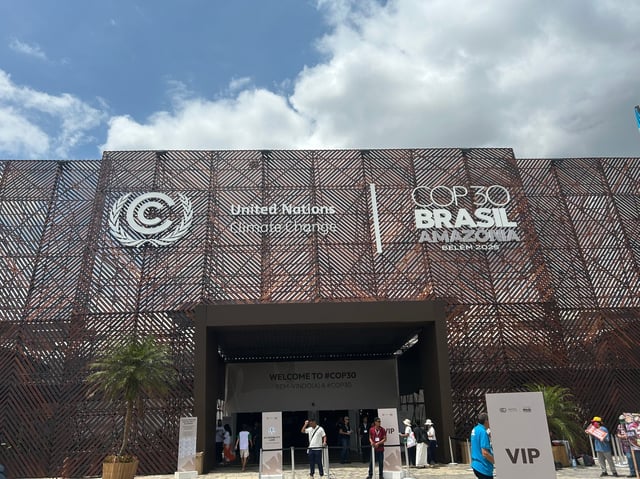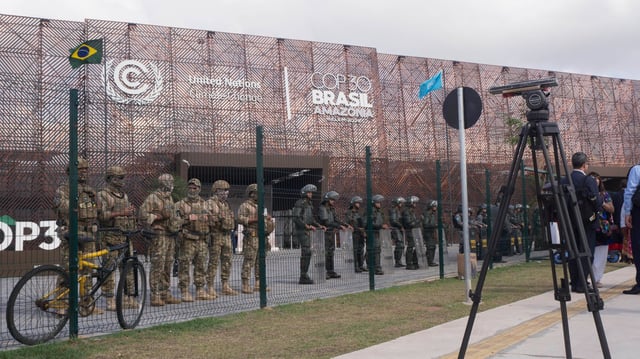
Delegates and other COP30 attendees exiting the Blue Zone. Photo by Lindsay Crowder
The world learned a truth in Brazil this week, just not the one it may have preferred. The final text of the COP30 presidency was published late on Saturday morning, hours before the final plenary—an exercise originally scheduled for 10am, then 11am, before finally starting three hours late. The preamble pitched the process as a “COP of Truth” intended to restore “trust and hope in the fight against climate change by bringing science, equity and political determination together, promoting information integrity and strengthening multilateralism, connecting the process with people on the ground and accelerating the implementation of the Paris Agreement.”
They were pretty words, followed by little action. All mention of fossil fuels were stripped from the Mutirão—a word originally from the Tupi-Guarani language to describe an act of mutual aid undertaken without payment and given to the primary decision document at COP30. For all the symbolism it invoked, the document contained no explicit talk about phasing out fossil fuels. There were only two references to the United Arab Emirates Consensus—a binding agreement made at COP28 in Dubai two years before to phase out oil, gas and coal in line with the science—enough to make sure the promise was not forgotten, but not enough to remember what was pledged. Once again, there were no provisions for climate finance to aid adaptation. Commitment to the Paris Agreement was reaffirmed, but any language that would have delivered on making this the promised “implementation COP” was absent.

COP30 Blue Zone. Photo by Royce Kurmelovs.
The list of issues with the final text was long.
COP30 President André Corrêa do Lago, however, gavelled through the materials at speed. He opened the session with technical matters and, before anyone knew what happened, the texts were adopted, over and above simmering objections. The deal done, COP30 President Lago took a moment to acknowledge his critics.
“We know some of you have greater ambitions for some of the issues that happened,” Lago said. “I know the youth and civil society will demand us to do more to fight climate change. I want to affirm that I will try not to disappoint you during my presidency of this COP.”
It was then De Lago announced he would work for the rest of his presidency to develop two roadmaps, one on halting and reversing deforestation and another on transitioning away from fossil fuels to loud applause.
“They will be led by science, and they will be inclusive,” he said. “With the spirit of the Mutirão, we will convene high level dialogs, gathering key international organizations, governments, from both producing and consuming countries, industry workers, scholars, civil society, and will report back to the COP. We will also benefit from the first international conference for the phase out of fossil fuels, scheduled to take place in April in Colombia.”
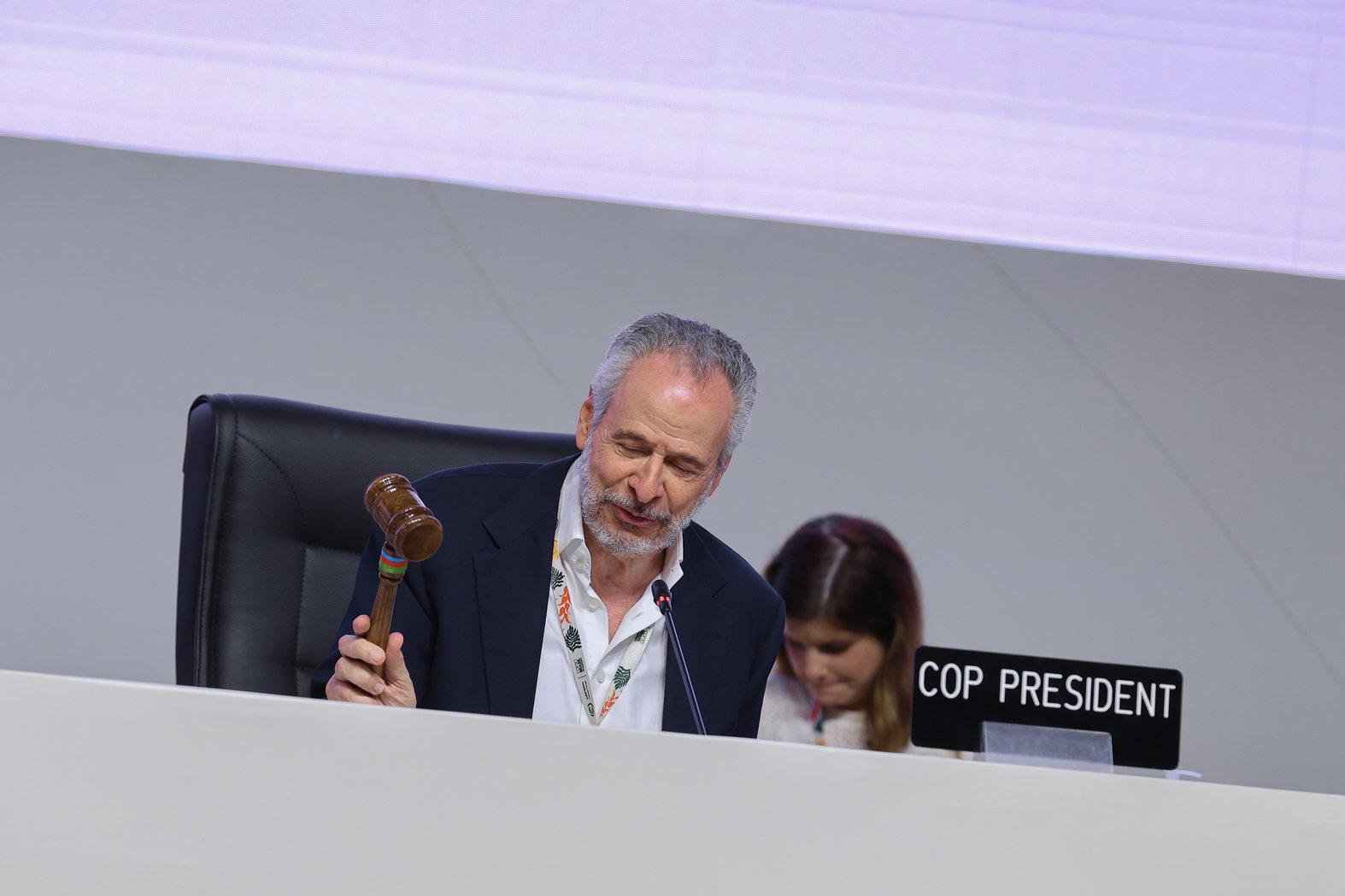
COP30 President André Corrêa do Lago,.Photo by IISD/ENB | Mike Muzurakis
What this actually means is an open question. Many well-intentioned initiatives have been launched at COPs past only to die in obscurity, and any proposal to develop a plan for a roadmap to phase out fossil fuels would test the limits of credulity. Civil society groups, for their part, weren’t buying it. Carolina Pasquali, Executive Director, Greenpeace Brazil said the COP30 text represented a win for fossil fuel producers.
“This was a crossroad—a properly funded path to 1.5°C or a highway to climate catastrophe—and while many governments are willing to act, a powerful minority is not,” she said.
Climate scientist Bill Hare from Climate Analytics said there was no point “embracing the science” if it was not met with action.
“The traditional COP model is under serious strain in a fractured, multipolar world, particularly from countries prepared to sacrifice the well-being of the world for fossil fuel interests,” he said.
The real tell was in the final line–one that foreshadowed what was about to happen next. COP30 in Belém was meant to be Brazil’s show, but late in the second week Colombia upstaged their hosts when it announced the creation of an initiative whereby a group of countries would meet to plan the phase out of fossil fuels. The 24-country bloc will meet next April in Santa Marta for a conference co-hosted by Colombia and the Netherlands. Other participating countries include Australia, Austria, Belgium, Cambodia, Chile, Colombia, Costa Rica, Denmark, Fiji, Finland, Ireland, Jamaica, Kenya, Luxembourg, Marshall Islands, Mexico, Micronesia, Nepal, Panama, Spain, Slovenia, Vanuatu and Tuvalu.
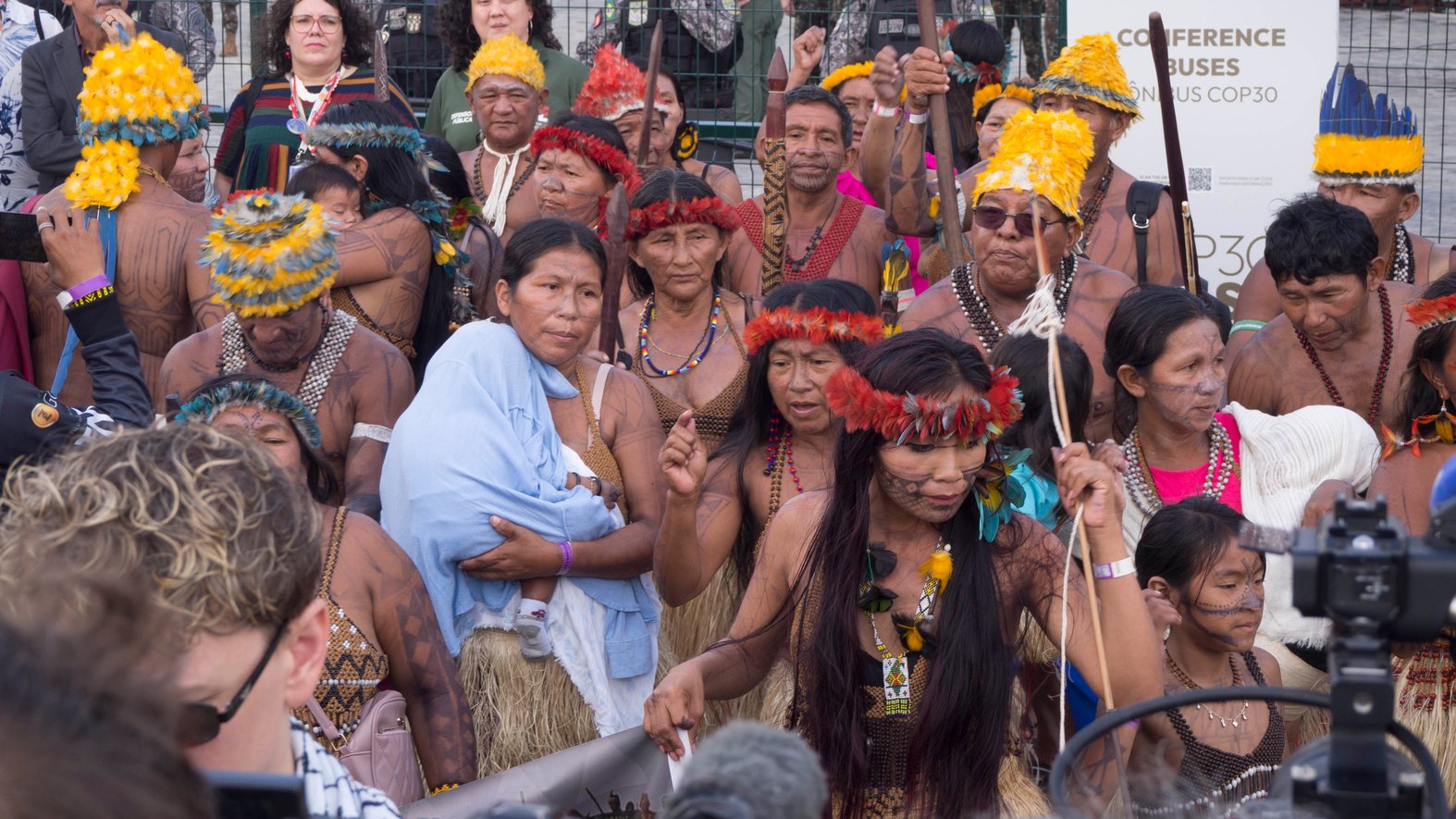

Indigenous protestors outside and inside the COP30 Blue Zone. (Top photo by Royce Kurmelovs / Bottom photo by Lindsay Crowder).
Brazil had reportedly brushed off approaches by Colombia about how its external proposal might work with the COP process in the days leading up to the announcement. When it finally arrived—delayed by a fire in the exhibition hall that left a gaping hole in the roof and the acrid smell of burnt plastic in the area—Colombia’s Environment and Sustainable Development Minister, Irene Vélez Torres, framed it as a counterweight to reactionary forces that sought to block climate action at every COP.
“I think what the problem is right now is the methodology of consensus, because this consensus has turned into veto,” Torres told reporters on Thursday in Belém. “So the most ambitious agenda has been eliminated. Veto is what is happening here.”
If it should succeed—a big “if”—the group could contribute to a growing diplomatic, political and legal momentum developing outside the COP process, alongside initiatives like the Fossil Fuel Non-Proliferation Treaty promoted by Pacific Nations. Were it able to grow its membership and draft an actionable plan for fossil fuel phaseout, the group could offer a means to push back against reactionary groups seeking to slow the end of oil, gas and coal.
If Brazil had been feeling upstaged by Colombia, that feeling would become a reality in the closing plenary. Following a series of complaints about procedural matters, Colombia took the floor. They had been overlooked, they alleged. Colombia had wanted to add specific language calling for work to be undertaken to plan a phase out of fossil fuels, but had been ignored in the rush to pass the agreement. This sequence of events left them no choice: they formally objected to the final text.

The Colombian delegation at COP30 raising an objection. Photo by IISD/ENB | Mike Muzurakis
At first, Lago tried to breeze past the objection. It didn’t stand. Colombia insisted on the intervention and the effect was like kicking over the table at a poker game. The final plenary was suspended as a crowd of delegates rushed to confer on stage. Any suspicion that this amounted to political theatre faded as audible criticism could be heard over the microphones. No one, least of all the delegates, seemed to know what would happen next.
It was yet another unprecedented development in an event already heavy with metaphor. The United States had stayed home, though its chief negotiators still roamed the halls of the Blue Zone, having secured passes under other organizations, and China had taken an unusually prominent role. Some pavilions flooded at the start of the second week, thanks to heavier than usual rains. Then the total evacuation of the Blue Zone following a fire on Friday cost a full day of negotiations at a critical moment. No COP has run to time in two decades, and Belém never had good odds to begin with, but there was no hope after the fire. Taking advantage of the interregnum, the Brazilian COP Presidency locked itself away before releasing a draft text in the early hours of the morning. For all the talk of a COP of truth and the need for action, the result was a document that refused to say the “f” word. The commitment to “information integrity” rang hollow given its position in the preamble, a segment of the text normally reserved for platitudes, and the lack of meaningful commitment to fossil fuel phaseout that followed it.

Flooding in the Pacific Pavilion during COP30. Photo by Lindsay Crowder.
The approach would have been to the liking of Saudi Arabia, which has been one of the primary forces of obstruction at every COP and historically acted as a proxy for the United States. The two major BRICs countries, India and Russia seemed to be in lock step with Saudi Arabia, expressing their gratitude to the Brazilian presidency in the final plenary. A group of 29 countries threatened a veto if the provisions calling for fossil fuel phaseout were not restored, forcing negotiations to continue long into the night and early Saturday morning in Belém, but ultimately did nothing to change the text.
An earlier fight concerned who would host COP31 in 2026. The two candidates, Australia and Turkiye, had been deadlocked over hosting rights for the better part of two years. The dispute was decided by a combination of Turkish brinkmanship, German diplomatic pressure and cynical domestic Australian political maneuvering. The result was a novel hybrid model where Turkiye will formally host the COP but Australian Climate Minister Chris Bowen will serve as “COP President for Negotiations”. When the text outlining the arrangement was finally published online, reactions varied. Some suggested Australia had negotiated itself a subordinate position where it took on all the risk and Turkiye had the final say. Dean Bialek, a former climate negotiator said the artful vagaries of diplomatic language and convention were easily misunderstood, and Australia had actually managed to take control of the most important functions of the COP Presidency.
“It's a significant role,” Bialek said. “It's a very disappointing outcome, and many in Australia will see it as a significant step back from the original intention and expectation.
“That being said, the way that the partnership document is constructed, I think, makes it pretty clear that Chris Bowen will have a pretty much unfettered authority.”

Australian Climate Minister Chris Bowen speaks about the COP31 hosting arrangement in the Australia pavilion at COP30. Photo by Lindsay Crowder.
According to Climate Action Network Latin America, the one bright spot in the final COP presidency text was the creation of a mechanism within the Just Transition Work Program (JTWP), which they said “represents a significant political victory for Latin America.”
“The text incorporates most of the principles proposed by civil society, providing a substantive basis from which to move forward,” the group said in a statement. It also invites countries to integrate national pathways and recognizes the need for additional financing. However that win was tempered by the fact that operationalization of the mechanism was kicked down the road to COP31.
From beginning to the bitter end, COP30 was a tussle. As the plenary resumed, Lago delivered an apology for his procedural mistake, blaming sleep deprivation and his “advanced age”. Officially, though, a decision had been made, the text had been finalized and adopted, and there was no way to re-open it. To do so would set a bad precedent. Colombia’s objection would be noted and any issues it raised would be addressed in Bonn, Germany next year. The decision stopped the talks collapsing but chaos reigned. Russia accused the Latin American countries of behaving like children “who want to get their hands on all the sweets and stuff them down their throats”, prompting a unique moment of Latin American unity. India, too, threw barbs at Colombia and Panama, while Saudi Arabia persisted in seeking technical clarifications. It was the sort of scene that has prompted scholars of the COP process to suggest it is beyond repair unless the requirement for consensus is changed to a seven-eighths majority that would “stop a few obstructive countries from vetoing things the other 190 agree on,” as a recently published compendium of the peer-reviewed research on climate obstruction concludes.
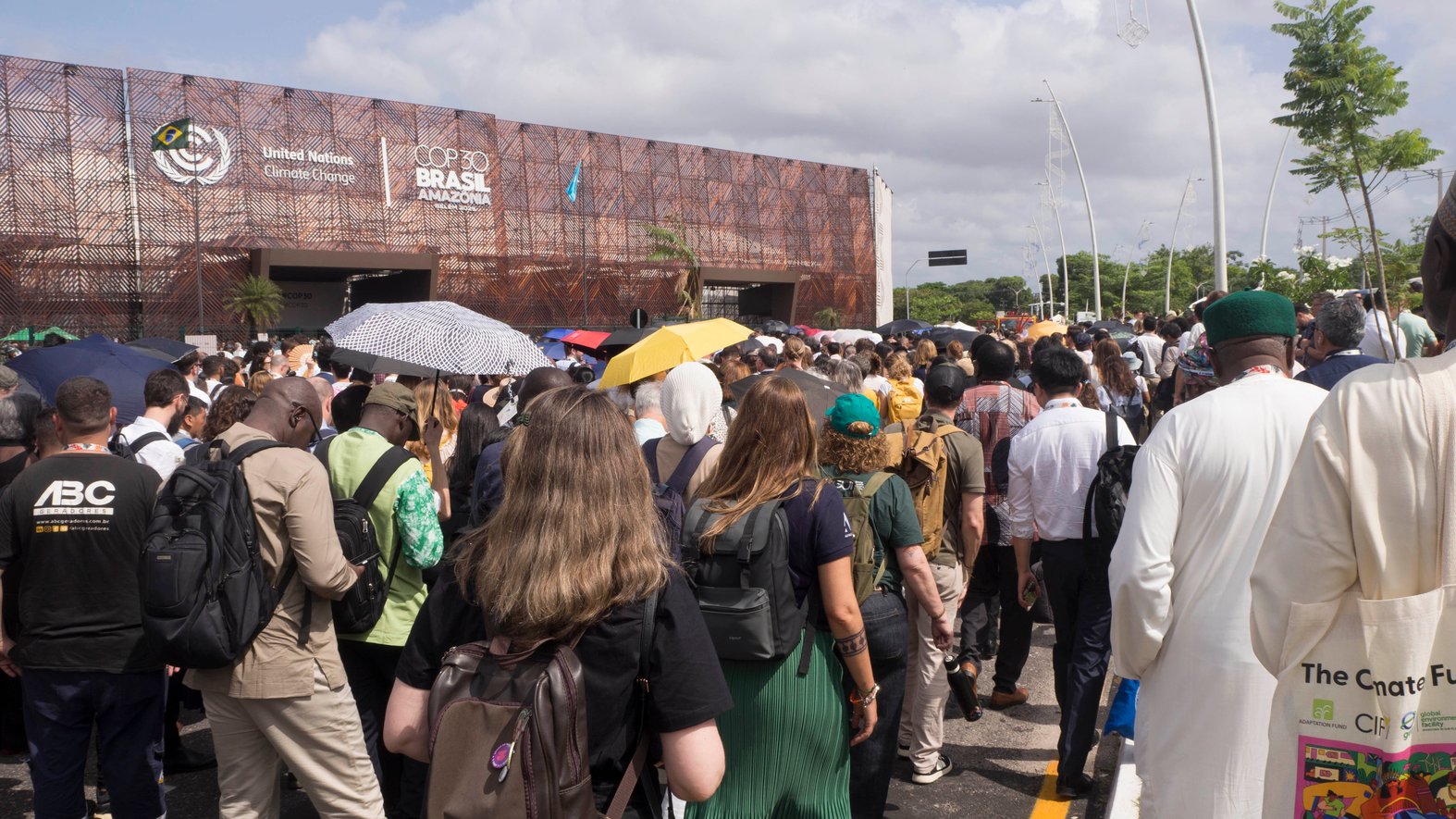
Attendees arriving at the COP30 Blue Zone in Belém. Photo by Royce Kurmelovs.
Throughout COP30, the scientific community had repeatedly and clearly emphasized the threat posed by a failure to act. Though the process did secure more scrutiny of fossil fuel producers, some money for forests and adaptation, and a new emphasis on trade and implementation, it only inched towards working through the collective phase out of oil, gas and coal. By its end, COP30 in Belém failed to secure any new agreement on ending the fossil fuel age, forcing the world to wait yet another year to see if global leaders will ever make good on their Paris promises.

